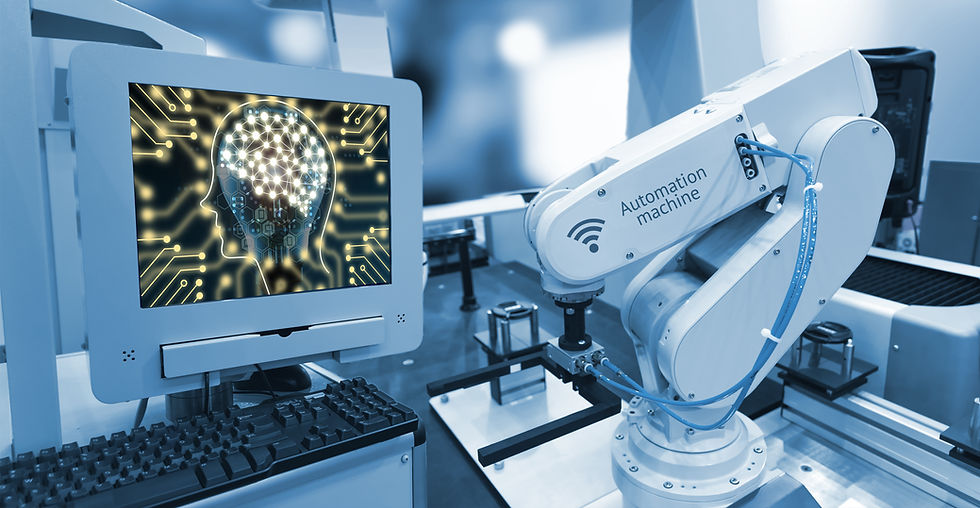The AI Paradox: What Artificial Intelligence Is and How It Can Help Us
- Dr Obinna Eleweanya
- Jul 3
- 3 min read

A technological revolution is happening right now, changing the way we live, work, and interact with each other in the 21st century. Artificial Intelligence (AI) is at the center of this revolution, and there are heated arguments about its possible pros and cons. Some people see AI as the answer to the biggest problems facing humanity, while others are wary of it because they are afraid of losing their jobs, their freedom, and other unexpected problems. This article will look at the real nature and value of AI in today's society and culture. It will talk to people who are skeptical and encourage a more nuanced understanding of this technology.
The History of AI: From Fiction to Fact
People have been interested in the idea of AI for a long time, going back to ancient myths and legends. But it wasn't until the middle of the 20th century that AI started to look like a real science. Alan Turing, Marvin Minsky, and John McCarthy were some of the first people to work on AI. Today, we can see how AI has changed many parts of life.
The Good Things About AI: A Way to Move Forward
1. Efficiency and Productivity: Automation powered by AI makes processes easier, allowing people to focus on more important work instead of boring tasks. Manufacturing, logistics, and healthcare are just a few of the industries that have already seen big improvements in efficiency and productivity.
2. Better Decision-Making: AI's ability to analyze data gives us information that people might miss, which helps us make better decisions in areas like finance, healthcare, and education.
3. Personalization and Customer Experience: AI-powered systems customize experiences to fit each person's needs. This is changing fields like entertainment, marketing, and customer service.
4. Advances in Health Care: AI-assisted diagnosis and treatment have made patients better, and AI-powered research is speeding up the search for new drugs and treatments.
Addressing Doubters: Worries and Misunderstandings
1. Job Displacement: AI might take over some jobs, but it also opens up new job and business opportunities. AI can make people more productive and efficient by giving them more power.
2. Loss of Autonomy: AI systems are meant to help people, not take their place. People can make better choices and stay in charge when they work with AI.
3. Bias and Fairness: If AI systems are trained on biased data, they can keep those biases going. Researchers and developers are working to fix these problems, though, and AI development needs to be open and accountable.
The Future of AI: Working Together and Living Together
Instead of being afraid of AI, we should focus on using its power to make the world a better place and move forward. Humans can do the following with AI:
1. Enhance Human Abilities: AI can improve people's thinking, creativity, and productivity, which can lead to breakthroughs in many areas.
2. Tackle Difficult Problems: AI can help with important global problems like climate change, healthcare, and education.
3. Encourage Innovation and Entrepreneurship: AI can help create new business models, products, and services, which can lead to economic growth and new ideas.
Embracing AI: A Call to Action
It's time for skeptics to rethink their views on AI. We can do the following by accepting and using this technology:
1. Make AI Systems More Advanced: Working together with AI can make AI systems more advanced, open, and responsible.
2. Address AI's Challenges: We can work together to lessen the possible problems with AI and make sure that its benefits are shared fairly.
3. Unlock AI's Full Potential: We can make the world a better place for everyone by using AI's full potential.
Final Thoughts
The real value and nature of AI come from its ability to enhance human abilities, push progress, and make lives better. We should not be afraid of or turn down AI; instead, we should work with it to make the future better. We can get the most out of AI and make sure everyone benefits from it by accepting it and dealing with its problems. Come join the conversation and help us shape the future of AI.

Suggestions for More Research
1. AI Ethics and Governance: Look into the moral issues that AI raises and create guidelines for how to build and use AI in a responsible way.
2. AI Education and Awareness: Teach people about the pros and cons of AI to help them understand this technology better.
3. AI Research and Development: Keep putting money into AI research, with the goal of making AI systems that are more advanced, open, and accountable.
We can make sure that everyone benefits from AI by working together. We can shape the future of AI, so let's take this chance.




Comments